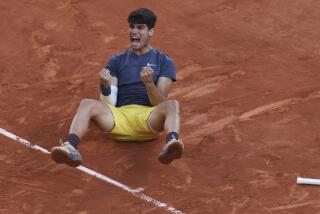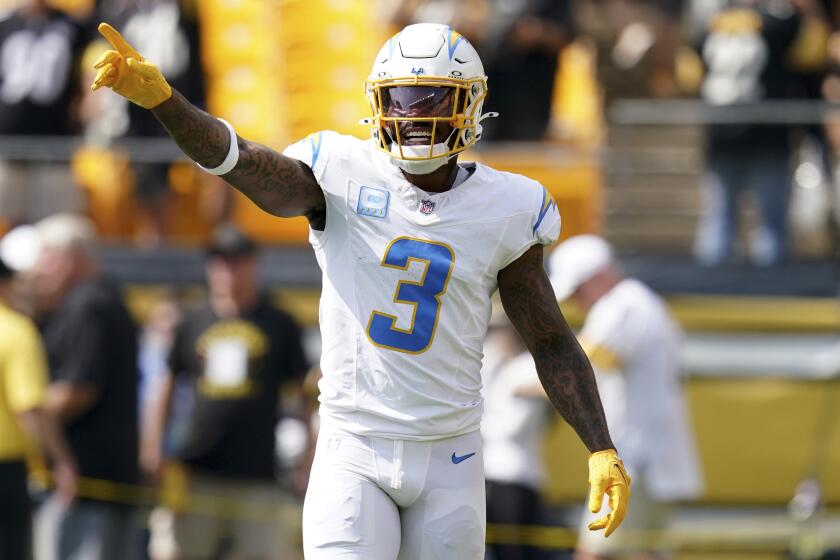French Open Tennis : Arias Will Meet Becker Next on Comeback Trail
PARIS â Ten weeks after his career hit rock bottom, Jimmy Arias is back where he feels he belongs--or at least close to it. Saturday, he fought frustration and exhaustion for almost four hours to reach the round of 16 of the French Open and an appointment with Boris Becker of West Germany.
It was not easy, though. Arias needed every ounce of available energy to slip past Jorge Arrese of Spain, 4-6, 7-6, 6-2, 4-6, 6-2.
âI was uptight all day because I kept thinking about playing Becker,â Arias said. âEvery time I made a mistake I would get mad at myself and say, âCome on, donât blow this.â I probably made things tougher on myself than I should have.â
But he survived, as did the second-seeded Becker, who beat Henrik Sundstrom of Sweden, 6-1, 3-6, 6-3, 6-1.
Also reaching the fourth round were fourth-seeded Mats Wilander of Sweden, sixth-seeded Yannick Noah of France and eighth-seeded Jimmy Connors.
Wilander beat Aaron Krickstein, 6-1, 6-7, 6-2, 6-2. Noah defeated Michiel Schapers of the Netherlands, 6-3, 6-2, 6-2, and Connors eliminated Franco Davin of Argentina, 6-3, 6-1, 6-2.
In womenâs fourth-round play, second-seeded Steffi Graf of West Germany extended her winning streak to 36 matches with a 7-6, 6-2 victory over Helen Kelesi of Canada.
In earlier rounds, however, the 17-year-old West German had never lost more than one game in a set, winning in 57, 32 and 45 minutes. Saturday, she faced a set point and needed 97 minutes to defeat Kelesi.
âShe played very well,â Graf said. âBut Iâm sitting here now wanting to go out and play again because I am saying, âDamn, I can do better than that.â â
Graf did well enough to join sixth-seeded Manuela Maleeva of Bulgaria and seventh-seeded Gabriela Sabatini of Argentina in the quarterfinals. Sabatini beat Karen Schimper of South Africa, 6-4, 6-1, and Maleeva got past Stephanie Rehe, 7-6, 6-1. The fourth winner was 15-year-old Arantxa Sanchez of Spain, who beat Carina Karlsson of Sweden, 6-1, 6-4.
The Arias-Arrese match was the longest and, without doubt, the most entertaining of the day. For Arias, this is an important tournament. In 1983, he was ranked sixth in the world at the age of 19 and reached the U.S. Open semifinals. Since then, he has been on a long slide, one that reached a low point in March.
His ranking was down to 57th. That was bad enough. Then came Paraguay. Playing Davis Cup, Arias had a chance to clinch a victory for the United States by beating Hugo Chapacu, the 282nd-ranked player in the world. The United States led, 2-1, and an Arias victory was considered a must because Aaron Krickstein was given little chance in the fifth match against Victor Pecci.
With the crowd screeching on every point, Arias lost, 9-7, in the fifth set, perhaps the most stunning and difficult defeat of his life. Pecci then beat Krickstein, and Arias felt responsible for the defeat.
âFor two days after that match, I couldnât go to sleep,â he said. âEvery time I closed my eyes I would see easy shots that I had missed or bad calls or whatever.
âThat was the low point for me, no doubt about it.
âI just figured after that, things couldnât get any worse. I told myself that there wasnât any pressure any more because what else could go wrong? I tried to go out and not be so uptight and just play.
âI know Iâll never forget that match, though. When I got to Rome (for the Italian Open), I was walking in the locker room and the first person I saw, the first one, was Hugo Chapacu. I almost turned around and went back home. But things are better now.â
Since Paraguay, Arias has come back. He beat Becker to reach the final at Monte Carlo, and he is now ranked 39th.
In the meantime, Connors, who had played almost four hours to get into the third round, had little more than a workout against Davin. There were many ironies in this match-up--Connors, 34, playing someone exactly half his age; the oldest man left in the field against the youngest.
Connors had said Thursday night that if he had to play Friday, âIâll see you guys in London.â The old bones were creaking. But Saturday, he moved like the young Jimbo, who once owned the tennis world, and moved into the round of 16. There is still a little life in the old man yet.
More to Read
Go beyond the scoreboard
Get the latest on L.A.'s teams in the daily Sports Report newsletter.
You may occasionally receive promotional content from the Los Angeles Times.










